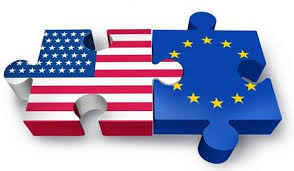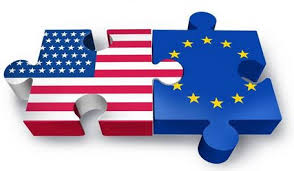
The important free trade talks between the U.S. and the European Union teetering on the brink of collapse and the French and German government ministers have blamed the U.S. protectionism attitude for this.
"Those who are protectionist are Americans, Europe is very open," Matthias Fekl, France's Minister of State for Foreign Trade, Tourism and French Nationals Abroad, told CNBC on Monday.
The minister added that is no further progress is made then France is prepared to walk away from the negotiations for the high-profile Transatlantic Trade and Investment Partnership (TTIP).
TTIP has failed, but "nobody is really admitting it", Sigmar Gabriel, Germany's Vice-Chancellor, had said over the weekend. Fekl's comments come close on the heels of the German government comment. It is expected that pro-TTIP Chancellor Angela Merkel would the target of Gabriel’s campaign next year.
The "ball is still rolling" on the deal, a spokesperson for the European Commission insisted later on Monday.
Designed to make trade simpler by eliminating many of the tariffs in place to protect particular goods and industries, the TTIP - and its Asia-Pacific equivalent, the Trans-Pacific Partnership - are a key tenet of the President Barack Obama's policies. But fears about the potential negative fallout from globalization have gripped the two agreements already.
Taking a swipe at TTIP, the U.S. Republican presidential candidate Donald Trump has pledged to "never sign any trade agreement which hurts our workers or which diminishes our freedom and independence" and hence the political tide has been turning against TTIP and TTP for some time.
Negotiations have stalled over whether the benefits from removal of barriers to trade would be evenly distributed, even as increased trade and the removal of barriers to trade appear on one hand to benefit both sides of the agreement.
Fueled by concerns that the agreement might lower the standards of goods, cause job losses or allow greater powers to big business to sue governments, there has been a substantial grassroots campaign in Germany against the deal. The deal has been criticized for favoring the interests of U.S. businesses over Europeans by France's President Francois Hollande.
With examples such as the surprise vote in June for the U.K. to leave the EU – which means it will not be part of TTIP, the groundswell of opposition is part of a growing mistrust of elites and globalization around the world. According to the U.K. business group the Confederation of British Industry, if the UK had stayed within the EU, it would have been up to £10 billion a year better off under TTIP.
Earlier during the weekend, Germany's Economy Minister Sigmar Gabriel on Sunday announced the failure of the TTIP. It is a free trade deal being negotiated by the United States and the European Union.
"The negotiations with the USA have de facto failed because we Europeans did not want to subject ourselves to American demands. Things are not moving on that front," he said.
"The talks with the US have de facto failed because we Europeans of course must not succumb to American demands. Nothing is moving forward," he told the public German broadcaster ZDF.
(Source:www.cnbc.com)
"Those who are protectionist are Americans, Europe is very open," Matthias Fekl, France's Minister of State for Foreign Trade, Tourism and French Nationals Abroad, told CNBC on Monday.
The minister added that is no further progress is made then France is prepared to walk away from the negotiations for the high-profile Transatlantic Trade and Investment Partnership (TTIP).
TTIP has failed, but "nobody is really admitting it", Sigmar Gabriel, Germany's Vice-Chancellor, had said over the weekend. Fekl's comments come close on the heels of the German government comment. It is expected that pro-TTIP Chancellor Angela Merkel would the target of Gabriel’s campaign next year.
The "ball is still rolling" on the deal, a spokesperson for the European Commission insisted later on Monday.
Designed to make trade simpler by eliminating many of the tariffs in place to protect particular goods and industries, the TTIP - and its Asia-Pacific equivalent, the Trans-Pacific Partnership - are a key tenet of the President Barack Obama's policies. But fears about the potential negative fallout from globalization have gripped the two agreements already.
Taking a swipe at TTIP, the U.S. Republican presidential candidate Donald Trump has pledged to "never sign any trade agreement which hurts our workers or which diminishes our freedom and independence" and hence the political tide has been turning against TTIP and TTP for some time.
Negotiations have stalled over whether the benefits from removal of barriers to trade would be evenly distributed, even as increased trade and the removal of barriers to trade appear on one hand to benefit both sides of the agreement.
Fueled by concerns that the agreement might lower the standards of goods, cause job losses or allow greater powers to big business to sue governments, there has been a substantial grassroots campaign in Germany against the deal. The deal has been criticized for favoring the interests of U.S. businesses over Europeans by France's President Francois Hollande.
With examples such as the surprise vote in June for the U.K. to leave the EU – which means it will not be part of TTIP, the groundswell of opposition is part of a growing mistrust of elites and globalization around the world. According to the U.K. business group the Confederation of British Industry, if the UK had stayed within the EU, it would have been up to £10 billion a year better off under TTIP.
Earlier during the weekend, Germany's Economy Minister Sigmar Gabriel on Sunday announced the failure of the TTIP. It is a free trade deal being negotiated by the United States and the European Union.
"The negotiations with the USA have de facto failed because we Europeans did not want to subject ourselves to American demands. Things are not moving on that front," he said.
"The talks with the US have de facto failed because we Europeans of course must not succumb to American demands. Nothing is moving forward," he told the public German broadcaster ZDF.
(Source:www.cnbc.com)





